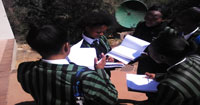National Schools Debates Competition 2014 – Provincial Workshops (20 September 2014)
News category: Newnano
 The National Schools Debates Competition is an initiative that gives learners in Grades nine to 11 an opportunity to develop their research, critical thinking and information literacy skills, as well as their ability to work as a team to present logical, clear arguments.
The National Schools Debates Competition is an initiative that gives learners in Grades nine to 11 an opportunity to develop their research, critical thinking and information literacy skills, as well as their ability to work as a team to present logical, clear arguments.
One of the objectives of the competition is to build science communication ambassadors out of these learners through researching and debating scientific topics and their related issues. On 20 September SAASTA began the 2014 competition by facilitating provincial workshops across the country, which served as an introduction to the structure and roll out of the competition.
Very often people hear of a new scientific field of endeavour and immediately reject it without really knowing and fully understanding what it is. It is for this reason that science communication tries to provide all relevant information about the science and its related issues, both its positive and potentially negative impact, and encourages people to critical evaluate information before forming their opinions.”on that information. Science communication ambassadors are therefore crucial to ensuring that science becomes part of South African’s everyday dialogue. A number of years ago, in line with its mandate, SAASTA started the schools debates initiative with the main intention of getting learners to research a science topic, understand it and then communicate the science and related issues through debate. The exposure to this scientific information empowers these learners with information that will enable them to make informed decisions on future science issues and open their eyes to the wonder and impact of science in their everyday lives.
The provincial workshop was therefore organised to prepare and equip the group of learners, who will be debating at provincial competitions, with the scientific information, debating style and an understanding of the five arguments of science communication. The science communication arguments are utilised to clearly direct the debates in a fashion that will encourage research and exploration of the topic. The debating style used by SAASTA is unique and exciting and allows team members an opportunity to formulate their own views about the topic, after which those statements are closely evaluated by the whole group.
The workshops further introduced the scientific topic which will be debated at the provincial level by the same group of learners. With the provincial competition scientific topic linked to nanotechnology and crystallography, it was crucial that SAASTA, through the NPEP programme, provides these learners with access to experts in the field of nanotechnology. SAASTA would like to thank the nanotechnology specialists who, on 20 and 26 September 2014, engaged with the workshop participants and introduced the 2014 provincial topic, giving learners and educators the required background information to commence with their research before the provincial competition. The following specialists were part of the provincial workshops: Dr Joseph Hato (University of Limpopo), Dr Lucky Sikhwivhilu (MINTEK), Dr Ouassini Nemraoui (Central Peninsula University of Technology), Dr Muhammad Bala (University of KwaZulu-Natal), Mr Steven Mafumadi (University of Witwatersrand), Mrs Mary Mathews (Walter Sisulu University) and Professor Martin Ntwaeaborwa (University of Free State). The abovementioned specialists have also been requested to act as adjudicators at the provincial competitions in October 2014.
The provincial competitions will be held on the following dates: 11 October (Gauteng, Free State, Northern Cape and KwaZulu Natal), 18 October (Western Cape, Limpopo and Eastern Cape) and 25 October (Eastern Cape and Mpumalanga). The topic being debated is “South Africa is facing the global growing challenge of providing clean, safe drinking water to its citizens. Nanotechnology, with support from the field of crystallography in identifying and characterising materials, is one of the technologies being explored to address this problem. Do you think investment in nanotechnology research will provide a feasible solution to our water challenges?”
The winners of each provincial competition from each province will proceed to the national competition on the 04 December where the 2014 SAASTA National Schools Debates Champions will be crowned. Amongst some of the rewards that learners and their debating coaches (educators) could earn for their hard work includes trophies and medals, tablets, i-pods, digital cameras and an international trip or excursion to the competition winners.
